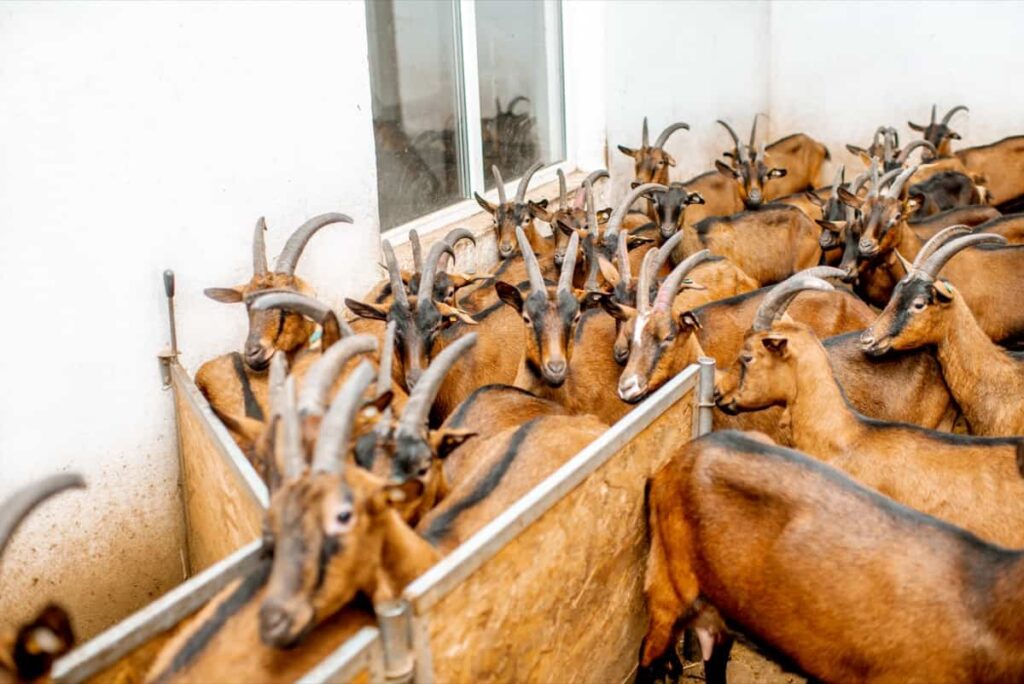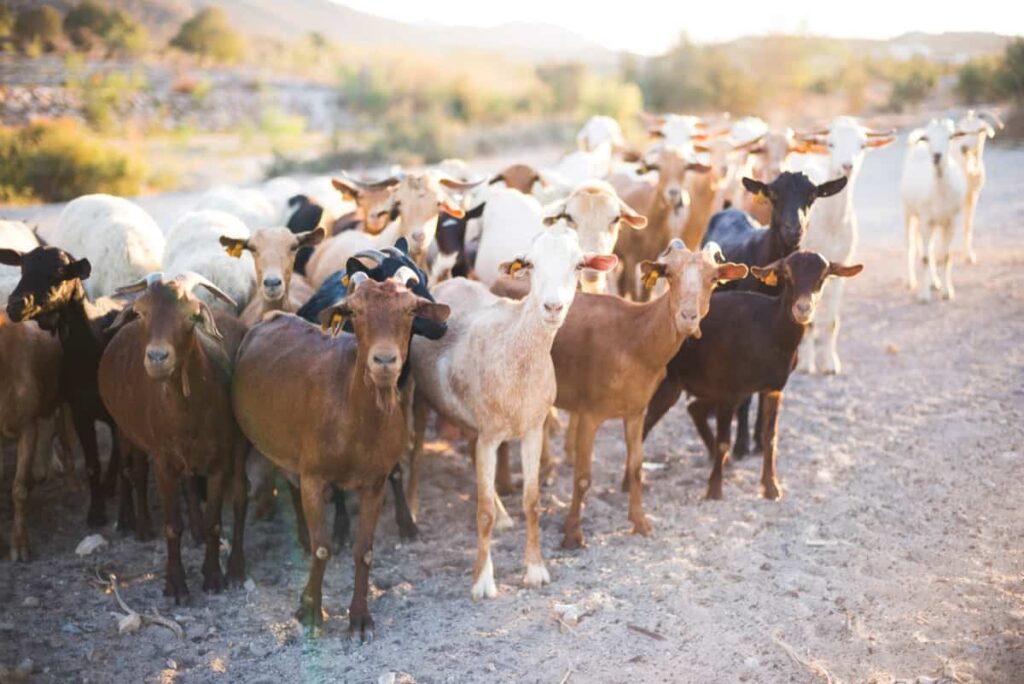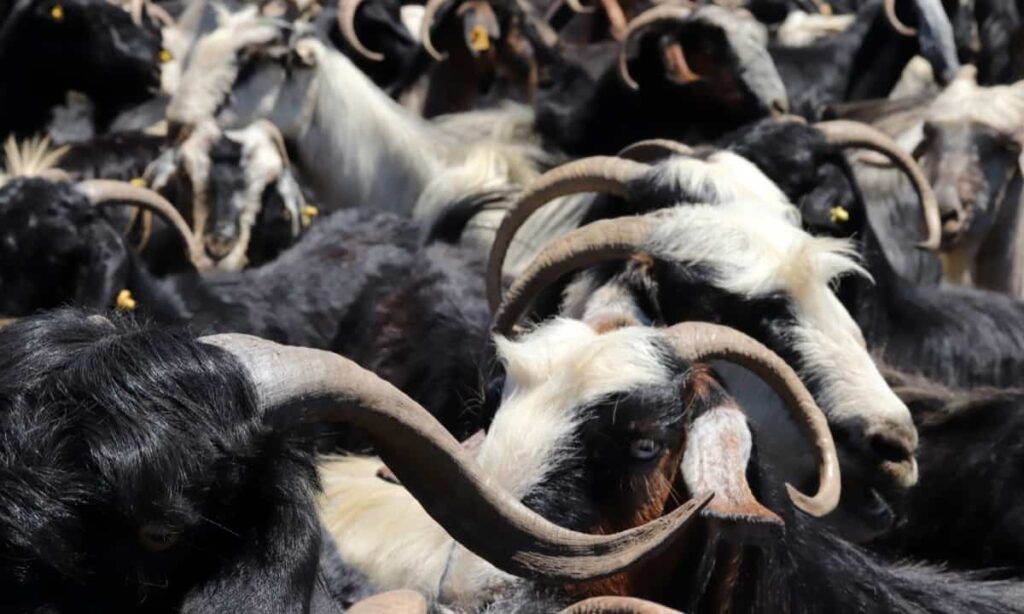Welcome to our comprehensive project report on Goat Farming in India! This blog aims to provide you with a simplified and easily digestible overview of this thriving agricultural sector. With accurate and up-to-date data, we’ll explore the booming opportunities and challenges faced by goat farmers across the country. We’ll cover everything from understanding the current market trends to the best practices in goat rearing. Whether you’re a seasoned farmer or a curious enthusiast, this report promises to deliver valuable insights to help you embark on a successful goat farming journey.

What is the Project Report on Goat Farming in India?
The Project Report on Goat Farming in India outlines establishing and managing a commercial goat farm. It covers location, housing, feed, water, labor, veterinary care, and market potential. The report highlights the profitability and opportunities in goat farming while addressing challenges and suggesting ways to overcome them.
Project Report of Goat Farming in India
Goat farming in India holds immense significance for small and marginal farmers, contributing to the economy and nutrition. The industry is experiencing growth, with an increasing number of commercial goat farms established nationwide.
Production Technology: The goat farm should be strategically located near a reliable year-round market and accessible to the main road. Low-cost housing with proper flooring and ample space per kid is essential for efficient management.
Feed & Fodder Cultivation: Fertile land with assured irrigation facilities enables the successful cultivation of abundant, high-quality green fodder for year-round feeding.
Water & Labor: Good quality fresh water and reliable labor supply are crucial for smooth farm operations.
Veterinary Aid: Proximity to veterinary aid and breeding centers is necessary to ensure the health and well-being of the goats.
Market Potential: The growing demand for goat meat and increasing purchasing power presents a lucrative market opportunity. India leads in goat population and milk production, making goat farming profitable.
SWOT Analysis: Strengths include low labor requirement, versatility, and adaptability of goats to adverse environments. Goat farming requires a relatively low initial investment, and there are no religious taboos against goat meat consumption. Opportunities arise from a ready market for goat meat with increasing prices. However, areas for improvement include the challenges of large-scale organized goat farming and high mortality rates among goat kids. The declining grazing land poses a significant threat to the industry’s growth.
Goat Farming in India: Market Analysis and Trends
Goat farming in India has witnessed significant growth due to its multifunctional role in the economy and nutrition of landless, small, and marginal farmers. With a large population of meat consumers and rising purchasing power, there is substantial domestic demand for goat meat.
The intensive and semi-intensive systems for commercial production have gained momentum, leading to the establishment of numerous commercial goat farms across the country. The demand for goat meat is outpacing the growth in the goat population, presenting a promising market opportunity. Additionally, goat rearing requires fewer investments and risks than dairy farming, making it an attractive venture for farmers.
Goat Breeds Suitable for Indian Climate and Conditions
- Jamunapari: Originating from Uttar Pradesh, these goats are known for their large size, high milk production, and excellent adaptation to hot and humid climates.
- Barbari: Hailing from Uttar Pradesh and Rajasthan, Barbari goats are small-sized and thrive in arid regions. They are prized for their meat and milk production.
- Sirohi: Native to Rajasthan, Sirohi goats are robust and resilient, well-suited for dry and semi-arid areas. They are popular for their high-quality meat.
- Beetal: Originating from Punjab and Haryana, Beetal goats are renowned for their rapid weight gain and adaptability to various climates.
- Osmanabadi: Native to Maharashtra, these goats are sturdy and efficient grazers, making them ideal for rugged terrains and dry regions.
- Black Bengal: Hailing from West Bengal, these goats are known for their disease resistance and high-quality meat production.
- Malabari: Native to Kerala, Malabari goats are well-adapted to tropical climates and are valued for their meat and milk.
- Tellicherry: Originating from Kerala, these goats thrive in coastal regions and are prized for their meat production.
- Jakhrana: Native to Rajasthan, Jakhrana goats are well-suited for arid climates and are appreciated for their high-quality milk.
- Marwari: Hailing from Rajasthan, Marwari goats are hardy and adaptable to hot and dry conditions, making them suitable for extensive grazing.
In case you missed it: Best Practices for Disease Prevention and Management in Goats: Strategies for Maintaining a Healthy Herd

Project Report of Goat Farming in India: Cost of Setting up a Goat Farm
Estimated costs, returns, and profits for setting up and operating a medium-sized goat farm with 100 Osmanabadi goat breeds in India. It indicates a potential return on investment of 49%, making goat farming a lucrative venture.
| Cost Item | Amount (INR) |
| Land and Infrastructure | 5,00,000 |
| Goat Purchase (100 nos) | 6,00,000 |
| Shelter Construction | 3,00,000 |
| Feed and Fodder (per year) | 2,50,000 |
| Veterinary Expenses (per year) | 30,000 |
| Labor (per year) | 1,20,000 |
| Equipment and Supplies | 1,50,000 |
| Miscellaneous Expenses | 50,000 |
| Total Initial Cost | 19,00,000 |
| Annual operation Cost | |
| Veterinary Care (per year) | 30,000 |
| Labor (per year) | 1,20,000 |
| Miscellaneous (per year) | 20,000 |
| Total Annual Cost | 4,20,000 |
| Projected Annual Revenue | |
| Sale of Goats | 12,00,000 |
| Sale of Milk | 1,50,000 |
| Total Revenue | 13,50,000 |
| Annual Profit | |
| Total Revenue | 13,50,000 |
| Total Expenses | 4,20,000 |
| Annual Profit | 9,30,000 |
Best Practices for Goat Management and Health Care
- Regular Health Checks: Conduct routine health checks to monitor the goats’ overall well-being, identify signs of illness early, and promptly administer appropriate treatments.
- Proper Nutrition: Ensure goats receive a balanced diet with adequate protein, minerals, and vitamins. Always provide access to clean and fresh water.
- Clean and Hygienic Environment: Maintain clean and well-drained pens or shelters to prevent the buildup of bacteria and parasites, reducing the risk of diseases.
- Parasite Control: Implement a strategic deworming program to control internal and external parasites, which can impact goats’ health and productivity.
- Vaccination Schedule: Follow a timely vaccination schedule to protect goats from common diseases prevalent in the area.
- Stress Reduction: Minimize stressors such as overcrowding and sudden changes in feed or environment to promote better health and productivity.
Goat Feed and Nutrition Requirements in Indian Farming
Goats need high-fiber roughage, including grass, hay, and crop residues, for healthy digestion and rumen function. Provide concentrates with protein, vitamins, and minerals to supplement roughage and meet nutritional needs. A 12-16% protein diet is suitable for maintenance, while 16-18% for lactating and growing goats. Ensure access to mineral blocks, supplements, and clean water. Divide daily rations into multiple feedings to avoid overeating and improve nutrient absorption. Select high-quality forage to improve nutrient intake and overall health.
Profitability and Income Potential in Indian Goat Farming
Indian goat farming offers significant profitability and income potential. With a growing demand for goat meat and milk, and relatively low initial investments and operational costs, farmers can achieve substantial returns.
Government Subsidies for Goat Farmers in India
India offers government subsidies for goat farmers, including Livestock Development Schemes, National Livestock Mission, Animal Husbandry Infrastructure Development Fund, Pradhan Mantri Mudra Yojana, and State-Specific Schemes. These schemes provide financial support for breed improvement, infrastructure, breed improvement, healthcare, fodder development, and modern farming practices. Additionally, many states provide small and marginal goat farmers loans to start or expand their businesses. These subsidies aim to promote sustainable livestock development and income growth for goat farmers in India.
In case you missed it: Goat Breeding and Genetics for Improved Productivity and Disease Resistance

Challenges and Solutions in Goat Farming in India
Goat farming in India faces challenges in disease management, feeding, breeding, reproduction, market access, pricing, and climate and environmental factors. Regular health checks, vaccinations, and prompt treatment are essential to address these challenges. Balanced diets with roughage, concentrates, and mineral supplements can help ensure proper nutrition. Breeding programs, controlled mating, and timely identification of estrus cycles can also help address these challenges. Addressing market linkages and understanding market demands can also help ensure goat health and productivity.
Conclusion
Project Report on Goat Farming in India highlights this agricultural venture’s immense potential and profitability. With proper management, health care, and market awareness, goat farming presents a promising opportunity for farmers to thrive in the country’s agriculture sector.
- Types of Grass Growing for Goat Farm
- How to Train Goats for Milking: A Beginners Guide
- Goat Milking Practices and Equipment: A Beginner’s Guide
- Goat Farming for Fiber: Producing Mohair and Cashmere
- Maximizing Goat Milk Production: Tips for Dairy Goat Farmers
- Goat Farming as a Family Business: Strategies for Success
- Profitable Kenya Goat Breeds for Commercial Dairy and Meat Business
- Unlock the Secrets of Oberhasli Goat: Discover Raising and Management Practices
- Ultimate Guide to Myotonic Goats: Explore Profile to Raising
Can u please share project report for 50 jamanpari female goats… If possible share it on my email address… Thanks
I don’t have any type of property, but I am interested in commercial goat farm please tell me ,can provide any bank loan to start its business?
You should talk to NABARD or Rural Grameena Bank for loans and subsidies.
please send me a detailed summery or project report for 50 goat`s commercial farm.
Kindly tell me that to start a commercial goat farm of 150 how much land is requierd, weather they take the natural grass or I have to grow any hybrig grass for the goats.
Please share the name of grasses which can be grown in dry climate of Rajasthan. Irrigation through tube well is available.
Can you please provide me the address of goat farm which is providing the some basis training in the goat farming.
We have 5 nights of land in the Nadia district, West Bengal. May we have your company as our consultant. So provide your details, contact numbers & address , so that we can contact you easily.
Please don’t treat it as urgent.
Thanks
Udit’s Sen.
Dear Brother,
Kindly send to me 50 number of goat farming project report in my mail,
Thanking you…
Dear sir/Madam,
I am interested this forming, i have land but not sufficient amount to open the forming. Please guide us how to open the goat forming.
Regards,
B. Prakash
At Pangri post Bhandegaon tq di Hingoli
Hi, I’m a documentary film maker turning livestock farmer. What are the possibilities of goat farming in Dehradun, Uttarakhand. And what would be the best breed. I personally would like to rear better quality breeds, like Telicherry, Osmanabadi and Boer mix. Is it a viable option, as people in the north are not generally aware or care much about the meat they are eating, as long as it is cheap.
I want to start my own Goat farming in my city kolar gold fields in my own land. Also I am an Scheduled Caste citizen of India ,I am in need of project report which has to be the Bank ,will you help me.
I am Interested goat farming Please Provide project Report
it is a great report
can you share an excel format your costing and financials
thank you
will you please share the good breed for goat rearing???
Jamnapari goats are best reared goats for milk and Boer Goat is best for meat production.
I live in Nagpur, Maharashtra, I have about 12 acres of fertile land with a borewell, canal and ponds without fence, and at the moment my family only cultivates wheat, legumes and rice. I want to start goat farming (initial start-up with 100 and extension to 500) combined with poultry (1000 Desi chicken in open space) and fruits like leman, mango, pomegranate, custard apple, guava, drumstick etc. All waste from goat farming will be used to grow vegetables and fruits. I will start with a normal shelter for a goat farm, then I will build a elevated shed for less maintenance.
Can you help me regarding
1. Selection of goat breeds suitable for meat and milk in the NAGPUR region (compatibility with weather conditions)
2. Is an elevated goat shed very expensive? what should I do
3. Leading supplier of goats for my farm in the Nagpur region
4. Document requirement or any government license requirement for goartfarming startup
5. Whether I have to register my goatfarm or register a company/ business to get a bank loan
It will be my pleasure to thank you, please respond
I would like,to start 50+5goat form and i have 1hecter land too can u please send the project report to start in mandya dist.karnataka
Dear sir good morning ,Sir I want to start in my field where a tubewell , I want start a goat farm ,plz guide me whole information about this-mahaveer-8432169959
Kindly Share me a Model Project Report in a Excel Format
Thanks
I with Gowda intend to start a Goat rearing farm at KR peta about 1000-1200 goats in batches of 200-250 pl send me sketchy project report as well the shed size with other details pl if possible
my friend is basically from that area and Agriculturist with land in his name
thanks
Please send 50 jamnapuri goat project reports
We are already in the process of establishing our Goat farm .
Need your kind support to prepare a project report(Month wise i.e more sacrosand ) keeping in mind that after 2 years from starting will have around 5 lacs of profit margin . To achieve this target, how should we prepare for that .
I have touch based different organisations but not able to prepare the same – this will help me to track my business very closely to reach my goal .
Requesting you extended support for this .
I want a project from you may you please provide me
I want 100 goat form plan
Sir i wish to start a Goat farm in Pune on a leased land. I have about 15 acres land. I need a plan for 40 goats. I need assistance on Loan, breed to buy etc. Is it possible to get crowd funding or Private investors. Need details on size and material to be used for Goat farm construction.
Sir i have 9500 squire fit new construction plot with boundaries and I want 100 goat farming business
At my village. Please send 100 goats project report my mail. Id. I want get a loan with goat Subcidy scheame.
100 got project report meeraku ona